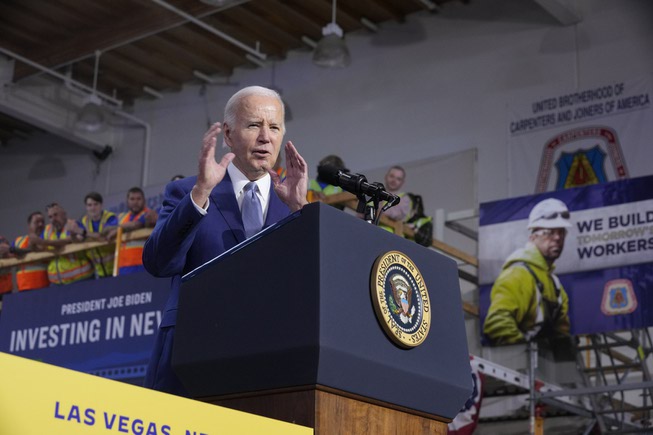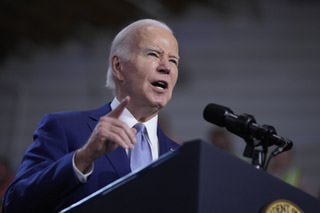
AP Photo/Manuel Balce Ceneta
President Joe Biden speaks Friday, Dec. 8, 2023, in Las Vegas.
Published Friday, Dec. 8, 2023 | 11:14 a.m.
Updated Friday, Dec. 8, 2023 | 5:23 p.m.
President Joe Biden was in Las Vegas on Friday to tout a new $3 billion federal grant that was awarded this week to aid in the construction of a high-speed rail project linking Southern Nevada to Southern California — the first of what he said could mark a new age for consumer transportation in the U.S.
His remarks from the Carpenters International Training Center came as the Biden Administration earlier in the day announced $8.2 billion in total funding for 10 passenger rail projects around the country. But the Brightline West project, which White House officials say should be finished in time for the 2028 Summer Olympic in Los Angeles, marks the “first world-class high-speed rail project in the nation,” Biden said.
“Railroads made America a force in commerce and innovation in the world, uniting the country and the most powerful economy ever in the history of the world,” Biden said.
The U.S., however, has lagged in recent years to update its infrastructure, which has hurt the economy, Biden said.
“We’re in an economic competition for the 21st century,” Biden said, alluding to China. “How can you be the best economy without having the best infrastructure? We’re gonna do that. That’s why I’m here, to talk about an ambitious vision for America to be fully within our reach.”
In addition to bolstering Nevada’s tourism and hospitality industries, the project will diversify other key sectors, Rep. Dina Titus, D-Nev., said.
“We have to have a way to put those heads in beds. We’ve got to put people in showrooms and in our restaurants,” Titus said. “We’ve got to have shoppers at our top-end malls. We’ve got to have fans in the stands. All of these folks have got to come to Las Vegas some way or another.”
The president spoke before roughly 250 attendees, most of which had some connection to various trade unions throughout Southern Nevada. The president was received by most of Nevada’s congressional delegation, and other attendees included Republican Gov. Joe Lombardo and former Gov. Steve Sisolak.
In a statement, Lombardo’s office said the project would be transformational for not only Las Vegas, but the region as well.
“The historic federal funding announced today is a critical piece of this project and the future of transportation in the West,” Lombardo said.
When completed, the Las Vegas-Rancho Cucamonga route will run along Interstate 15 and is expected to serve more than 11 million passengers annually. It will feature all-electric trains traveling at speeds up to 186 mph.
Brightline officials said the commute will take about 2 hours and 10 minutes, about half the time it takes to make the drive via I-15, a commute that can often be several hours longer on weekends and holidays due to the traffic bottlenecks.
“This is once-in-a-lifetime,” U.S. Sen. Catherine Cortez Masto, D-Nev., told the crowd. “This is how we in Nevada show and model for the rest of the country how you get it done.”
Wesley Edens, founder and chairman of Brightline, thanked the Biden administration for its investment and called it a “historic day” and a milestone for the country.
“We will always remember that it was here in Nevada where we created the nations’ first high-speed train that connects the great cities of Las Vegas and Los Angeles,” Edens said. “Infrastructure is the cornerstone of economic prosperity, and the president’s bold leadership has created the template for badly-needed upgrades to our nation’s infrastructure.”
Proponents say the project is “shovel ready” and will create 35,000 construction jobs and 1,000 permanent jobs. It is projected to take an estimated 3 million cars off the road.
But opponents say the $3 billion grant could have been better used for other matters and serves as nothing more than a handout to Edens, who has a net worth of roughly $4.6 billion, according to Forbes.
Sam Brown, who is running as a Republican to unseat Rosen in next year’s election, said in a statement the money could have been better used to secure the southern border, expand school choice programs or enhance public safety, among other things.
“This $3 billion government handout could easily have been structured as a secured loan that would protect taxpayers,” Brown said. “Instead, it’s an outright grant.
… Jacky Rosen delivered a $3 billion handout to a private equity billionaire, paid for by the American taxpayer.”
Talks to develop a light rail route from LA to Las Vegas have existed in some form since 2005. Amtrak passenger service ended its Desert Wind route, which included stops in Las Vegas, from Chicago to Los Angeles, in 1997.
“Nevadans have heard over and over again about the idea of high speed rail between Las Vegas and Southern California,” said U.S. Sen. Jacky Rosen. Such an historic project required historic funding, and that’s why this time is different.”
The funding was sourced from the 2021 Infrastructure Investment and Jobs Act, also known as the Bipartisan Infrastructure Law. Announcement of the grant award comes months after lawmakers from Nevada and California urged the U.S. Department of Transportation for final approval.
The Nevada Department of Transportation in March applied for federal grant funding on behalf of Brightline and with the support of the entire Nevada congressional delegation and four California congressional representatives. The Associated Press reported in April that about 70% of the $12 billion project will be privately funded, using a combination of debt and equity.
Transportation Secretary Pete Buttigieg told reporters on a call Thursday it’s important for the project to go smoothly so the public can trust that rail projects elsewhere come to fruition.
“My view is that once Americans actually experience even one high speed rail route, true high speed on American soil, then there’ll be no going back because people will expect it across the country,” Buttigieg said. “And a lot depends on being the first to provide that kind of service.”
Part of building that trust is getting adequate funding to support such a project, he said.
“So making sure that we have the right kind of public support to match the private funding that is going to cover the rest of the cost of this overall project is what we think is the best way to make good on our policy of encouraging high-speed rail wherever we can in the U.S.,” Buttigieg said.
Other projects the White House announced funding for include a separate high-speed train from LA to San Francisco, upgrades to rail corridors in Virginia, North Carolina and Washington, and upgrades to Chicago’s Union Station.
To date, the Biden administration has announced $30 billion for rail projects across the country, the largest federal investment in rail travel since the creation of Amtrak, according to the White House. That infusion has also led to more than $600 billion in private sector investments, he said.
“We’re making the biggest investment in history for passenger rail since the creation of Amtrak a half a century ago,” Biden said. “I’ve never been more optimistic about our future.”

